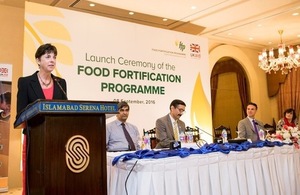New Food Fortification Programme to help tackle malnutrition in Pakistan
The UK’s Department for International Development has launched the Food Fortification Programme to improve the nutritional status of people in Pakistan.

Joanna Reid, the head of DFID Pakistan, speaking at the launch of Food Fortification Programme
A new Food Fortification Programme in Pakistan aims to reduce by a third iron deficiency anaemia, and by a quarter vitamin A deficiency in women and children by increasing the micronutrient content of flour and edible oil or ghee through fortification. The programme was launched yesterday in Islamabad by Joanna Reid, the head of DFID Pakistan. The event was also attended by State Minister Health Saira Afzal Tarar.
Pakistan has the third highest number of children under five in the world suffering from malnutrition. The most recent national survey[1] found that in Pakistan, 44% of under-fives are stunted - a measure of long-term malnutrition, 62% have anaemia and 54% have vitamin A deficiency. One in five children in Pakistan has a low birth weight. Also 51% of pregnant women have anaemia, 37% have iron deficiency and 46% have vitamin A deficiency.
The UK’s Department for International Development, working with Mott MacDonald and Micronutrient Initiative, is launching the Food Fortification Programme to improve the nutritional status of people in Pakistan, particularly women of childbearing age and children, through food fortification. Global evidence shows that food fortification is one of the most cost effective solutions to address chronic micronutrient deficiencies. Given that wheat flour, edible oils and ghee are consumed daily by most people in Pakistan, fortification of these staple foods can enhance micronutrients in food without requiring changes in eating habits.
The Programme will provide technical assistance to government at federal, provincial and district levels on technical standards, legislative and regulatory frameworks, as well as laboratory testing infrastructure. It will help millers with the financial costs of micro-feeder equipment and provide subsidies to mills towards the cost of premix as an incentive to produce high quality fortified flour. It will also provide training and technical support to millers. The Programme will help the public understand the benefits of fortified foods, so families can increase their demand for fortified wheat with iron, folic acid and edible oils with Vitamins A. It will generate evidence on policy and practice to strengthen decision making for food fortification.
The programme aims that within five years over half of the population of Pakistan is consuming fortified wheat flour and over two-thirds are using fortified edible oil and ghee, and will be working with over 1,000 wheat flour mills and 100 edible oil mills.
Joanna Reid, Head of DFID Pakistan, said:
The level of malnutrition in Pakistan is a tragedy. Nearly half of all children under five in Pakistan are chronically malnourished. Malnutrition leaves children more vulnerable to disease, stunts their mental and physical development, and leads to lifelong learning and memory deficiencies, and poorer achievement at school. It damages families and communities, locks in poverty and costs Pakistan around 2-3% of its GDP.
Food Fortification is a safe, cost-effective way of decreasing micronutrient deficiencies. That is why the British people, through UKaid, are investing in the Food Fortification Programme. We believe that this programme will benefit millions of lives in Pakistan.
I would also like to recognise the commitment shown by the Government of Pakistan, which has signed up to the Scaling Up Nutrition movement and prioritised ending malnutrition in its Vision 2025, as well as national, provincial and local government bodies across Pakistan for their support.
Joel Spicer, President and CEO of Micronutrient Initiative, the lead technical partner for FFP, noted:
This is a team approach –- that includes partners, all levels of government across multiple ministries, as well as the private sector. This project, and this group of champions recognizes that improving nutrition is the key to developing human potential and to securing the future of Pakistan.
Joel further highlighted the crucial leadership role of Pakistan and the UK as nutrition champions. He added:
Working together, FFP will make a critical contribution to freeing the people of Pakistan – particularly women and children - from the burden of malnutrition.
The lack of iron, vitamins A and D and other minerals limit the body’s ability to fight disease. Of the approximately 500,000 children who die each year in Pakistan before reaching their fifth birthday, half of these deaths are linked to malnutrition. Malnutrition also affects cognitive and physical development, malnourished children enrol in school later, have a reduced learning ability and have lower productivity when they reach adulthood. The damage of chronic malnutrition in the first two years of life is irreversible.
The Food Fortification Programme will be implemented on behalf of the UK by Mott MacDonald and Micronutrient Initiative. It will work closely with the Government of Pakistan, as well as communities and government at all levels. These include: the Ministry of National Health Services Regulations and Coordination; the National Fortification Alliance; the Provincial Fortification Alliances; the Pakistan Flour Mills Association; Pakistan Vanaspati Manufacturers Association; and the Pakistan Standards and Quality Control Authority.